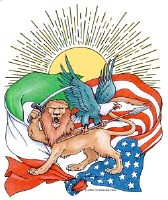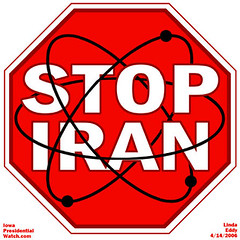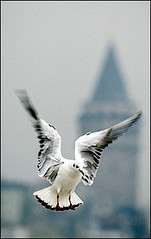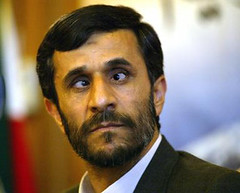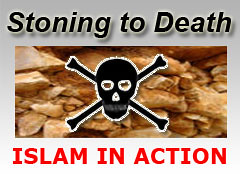Tuesday, July 31, 2007
DEFENSE & FOREIGN AFFAIRS SPECIAL ANALYSIS
Monday, July 30, 2007
WHY THE ANTIMULLAH DEDICATION ?
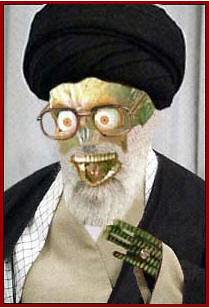 Those who oppose the mullahs oppose Islam itself; eliminate the mullahs and Islam shall disappear in fifty years. It is only the mullahs who can bring the people into the streets and make them die for Islam—begging to have their blood shed for Islam. Ayatollah Khomeini
Those who oppose the mullahs oppose Islam itself; eliminate the mullahs and Islam shall disappear in fifty years. It is only the mullahs who can bring the people into the streets and make them die for Islam—begging to have their blood shed for Islam. Ayatollah Khomeini
 If we...allow our rulers to be chosen by the ordinary people from among ordinary politicans, we will not have to wait long before we see the end of Islam.- Ayatollah Komeini
If we...allow our rulers to be chosen by the ordinary people from among ordinary politicans, we will not have to wait long before we see the end of Islam.- Ayatollah Komeini
 Islam is not Christianity...Islam is the religion of agitation, revolution, blood, liberation and martyrdom.
Sheikh Morteza Motahari, quoted in ‘Islamic Movements in the Last One Hundred Years,’ Tehran, 1979
Islam is not Christianity...Islam is the religion of agitation, revolution, blood, liberation and martyrdom.
Sheikh Morteza Motahari, quoted in ‘Islamic Movements in the Last One Hundred Years,’ Tehran, 1979
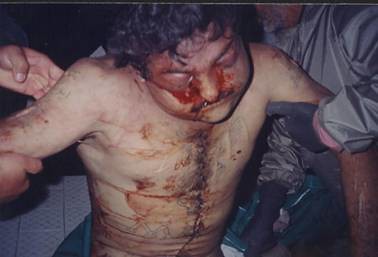 People say, ‘Don’t lie!’
But the principle is different when we serve the will of Allah.
He taught Man to lie so that we can save ourselves at moments of difficulty and confuse our enemies...
People say, ‘Don’t kill!’
But the Almighty Himself taught us how to kill...So shall we not kill when it is necessary for the triumph of the Faith? ...
Deceit, trickery, conspiracy, cheating, stealing and killing are nothing but means.
Muhammad Navab-Safavi, key figure in the fundamentalist movement, ‘Islamic Society and Government,’
People say, ‘Don’t lie!’
But the principle is different when we serve the will of Allah.
He taught Man to lie so that we can save ourselves at moments of difficulty and confuse our enemies...
People say, ‘Don’t kill!’
But the Almighty Himself taught us how to kill...So shall we not kill when it is necessary for the triumph of the Faith? ...
Deceit, trickery, conspiracy, cheating, stealing and killing are nothing but means.
Muhammad Navab-Safavi, key figure in the fundamentalist movement, ‘Islamic Society and Government,’ 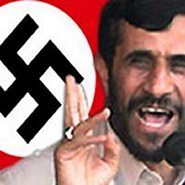
See complete dissertation at the permalink below
http://alanpetersnewsbriefs.blogspot.com/2007/07/truth-project-about-islam.html
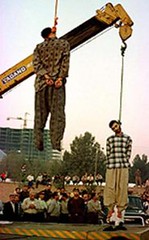
Sunday, July 29, 2007
GOD IS BEING REMOVED AND REPLACED BY ALLAH plus a SOLUTION to the Iran Situation
While the liberal left and the ACLU scream holy murder if the Christian God is mentioned anywhere, specially in schools or government related or even vaguely connected venues, Islamic school courses, like the obligatory 3-week one in 7th Grade California schools are being promoted. As is the thinly disguised project shown below. Admittedly, "Allah" is a pagan idol adopted by the prophet Mohammad as his version of God and was there thousands of years before islam, still, proponents claim it as a religion and it should thus be equally banned in schools and any other government funded organization. Instead, taxpayer funds in New York are being used to build a huge Islamic madrasseh for Arabic speakers and to promote (indirectly) the religion of Islam.
This is a project run by people like the cunning convert Susan Douglass of the Council on Islamic Education and the Islamic Society of North America. They're very well organized and have been orchestrating this comprehensive educational plan for many years with great success. Douglass has been very active and effective in Islamicizing the curriculum and textbooks used in the California public schools, the largest textbook market in the country and a bellweather for the U.S. This is how programs like the required three week course on Islam for all California 7th graders get implemented.
Check out the extensive list of Islamist organizations working on this project under "Community Engagement." It all looks very innocent and legitimate on the surface. Received from Parkhash A few days ago, I had a chance meeting with an old friend who used to be a student in Austria in the 1960s. Our conversation drifted to the subject of the 4 or 5 Iranian-Americans who are currently being detained in Iran. As we know she later returned to Iran and married Shaoul Bakhash, a British educated Iraqi Jew, who was then a correspondent for various foreign news agencies, including the BBC and Kayhan International. My friend also remembered Ali Shakeri, the so-called Peace building citizen in Orange County, who is now a co-detainee with the rest the group. Shakeri was also a confederation member (of course of a much lower significance than Esfandiari) in Austria before he moved to America. What is interesting in such findings is that both of these so-called democracy activist, have a long history of working to overthrow the Shah's government in favour of a Leftie-Akhundi regime. Ironically the Shah's government didn't touch these characters and even allowed them to return to and work in Iran. They were sent to Iran as the foot soldiers for that faction of the American political interests who favour a partnership with a moderate (????) wing of the Islamic republic of Iran. Obviously Ahmadinejad's regime is not easily fooled by such tricks. (Alan: Nor willing to waste time on stupid overtures. He hanged 16 people last week for "thuggery" (inappropritate social behavior) and plans to hang another 20 in the coming week. Nowhere is there any record of where they were arrested, if there were a trial held and what the exact crime was they committed. Thuggery and moral turpitude, which the plural word "obash" describes in Persian is the official catch-all charge for their deaths. The only notable identifier in all this are the faces of several of the men hanged also seen among the anti-AhmadiNejad students protest at the recent Amir Kabir University demonstration. Being against him is thuggery - punishable by death! Recent polls from inside and outside Iran indicate that 92% of the Iranian population is against this regime but for whom should they rise up? For whom should they overthrow the Mullahs? And get what in exchange? They overthrew the monarchy and got what? Sheer hell on earth in the form of purveyors of heaven. Now they want to know the cure is not worse than the sickness. For instance if they might likely get the MEK Mojaheddin instead of the Mullahs. Wouldn't be much worse for the general populace but politically on the global scene much worse for the world as Russia would then have an inside track, way beyond what is there already with the Mullahs, if the Marxist-Islamist MEK takes charge of Iran. Having examined all aspects of the situation on the ground to the extent to which I am privy, the West has to have two main goals: 1. To put their backing behind two or more of Iran's major tribes, like the Qashghai and Bakhtiari, perhaps in combination with the Boyer-Ahmadi, which all have tribal borders with each other. And oil rich Khuzestan. 2. To constitutionally establish a separation of church and state (the tribes will not object as they hate the Mullahs so badly they will enjoy poking the secular stick into their eye). Reason? The Mullahs wanted and tried and pushed to replace the traditional tribal leaders (Khans) with a Mullah appointed by Tehran. To the extent of executing some of those same leaders, notably from the Qashghai tribe. The new Constitution must simply state that NO religion is the religion of the country (not the case even under the Monarchy). And that the separation of church and state is so firmly driven into the document that it would be impossible to weaken it as time went by. AND, finally, the Methodology: Simplistically, these three tribes - for example - would revolt against the central Mullah regime and be assisted in this by he West and Israel. They border on Khuzestan, so they can draw upon the oil rich province to join them and prevent seccession. These tribes used to be fierce fighters traditionally and have quite large numbers, going into the millions, so would become a force to be reckoned with and because of terrain, not easily suppressed. As opposed to the Kurds and Azaris, who desire a separationist reward, these are "landlocked" and may desire a federal type of set up with their tribal areas equivalent to the "States" in the USA. So here in a matter of a few paragraphs is the formula. Time permitting I shall put this into more analyzed detail on the site. Such as this system being more difficult to penetrate by Socialist or Marxist ideologies. And more easily set up to confront religion because the Khans have power to rule by decree and can thus oppose any Mullahs showing up in their territories. Finally, since these tribes have rivalries and might need some political refereeing, a Constitutional Monarchy - somewhat along the lines of Britain but with greater final arbitration standing, could prove an effective structural or umbrella solution. The Supreme court tries to arbitrate in the USA but a monarchy with thousands of years of tradition in Iran would be more effective for the new Iran. The Monarchy does not have to revert to a previous dynasty but could be one the major tribal leaders jointly accept. Including the Pahlavi one under which some of them died (in early days) but under which they also prospered.
Saturday, July 28, 2007
CHECK OUT THE OTHER PAGES
ISLAMIC RELIGIOUS AFFAIRS MINISTER DEMANDS NUCLEAR FUEL
Friday, July 27, 2007
CAIR STATING THEY WILL IGNORE THE JOHN DOE ACT AND SUE
CAIR DISABLED THE COMMENTS ON THIS VIDEO, HERE IS A COPY WITH THE COMMENTS ENABLED - FEEL FREE TO COMMENT - courtesy http://www.freerepublic.com/
BY THE WAY - IN BRITAIN WHEN A LAWSUIT BY AN ISLAMIC GROUP AGAINST A GOVERNMENT ORGANZIATION FAILED AND THEY LOST THE SUIT, KNOW WHAT THEY DID?
ISSUED A RELIGIOUS DEATH FATWA AGAINST THE GROUP THEY SUED AND TO WHOM THEY LOST IN THE COURTS.
Can't do it legally and peacefully in the Courts of Justice - issue a death warrant fatwa instead! Islam the religion of peace!
America and Europe be VERY WORRIED!
Thursday, July 26, 2007
WHO IS BARACK OBAMA?
Wednesday, July 25, 2007
MARMOULAK - LIZARDS
Another satirical Persian, illustrated song decrying and criticizing the Mullahs, their hypocrisy, their suppression of the populace and their dirty bad habits. Worth watching for the amusement factor.
RADIO HOST CONFRONTS MOSLEM GUEST & Jihadists Online
Long article - big gaps in the scrolling - just jump or scroll down till you get to the main feature links. Worth the read.
JIHADISM ONLINE - A study of how al-Qaida and radical Islamist groups use the Internet for terrorist purposes
ROGAN, Hanna FFI/RAPPORT-2006/00915FORSVARETS FORSKNINGSINSTITUTT Norwegian Defence Research EstablishmentP O Box 25, NO-2027 Kjeller, Norway
Tuesday, July 24, 2007
CHANGE OF PACE - RANT & SMILE
Monday, July 23, 2007
IRAQI ARAB STREET RISING UP IN OUR FAVOR
 War On Terror: Not listening to Harry Reid or Nancy Pelosi, Iraqi Sunni and Shiite tribal leaders have formalized an alliance with U.S. forces and against al-Qaida.
The Arab street is rising up, and they're on our side.
The cut-and-run Democrats have long argued that our presence in Iraq has merely stirred things up and given al-Qaida an effective recruiting tool.
Well, we've certainly stirred things up — and thanks to the success of our surgin' general, David Petraeus, we have a bevy of new Iraqi recruits. Except they've got al-Qaida in their cross hairs.
On Saturday, members of the 1st Cavalry Division based near Taji brokered a formal agreement between Sunni and Shiite tribal leaders to join forces against al-Qaida and other jihadists. The Sunni and Shiite agreed to use members of more than 25 local tribes to protect the area around Taji, just 12 miles north of Baghdad.
The deal is just the latest example of the progress Democrats claim isn't happening in Iraq — a series of deals with various tribes and militia groups that at one point were part of the insurgency. But it's the first involving both Sunni and Shiite sheiks together.
War On Terror: Not listening to Harry Reid or Nancy Pelosi, Iraqi Sunni and Shiite tribal leaders have formalized an alliance with U.S. forces and against al-Qaida.
The Arab street is rising up, and they're on our side.
The cut-and-run Democrats have long argued that our presence in Iraq has merely stirred things up and given al-Qaida an effective recruiting tool.
Well, we've certainly stirred things up — and thanks to the success of our surgin' general, David Petraeus, we have a bevy of new Iraqi recruits. Except they've got al-Qaida in their cross hairs.
On Saturday, members of the 1st Cavalry Division based near Taji brokered a formal agreement between Sunni and Shiite tribal leaders to join forces against al-Qaida and other jihadists. The Sunni and Shiite agreed to use members of more than 25 local tribes to protect the area around Taji, just 12 miles north of Baghdad.
The deal is just the latest example of the progress Democrats claim isn't happening in Iraq — a series of deals with various tribes and militia groups that at one point were part of the insurgency. But it's the first involving both Sunni and Shiite sheiks together.


